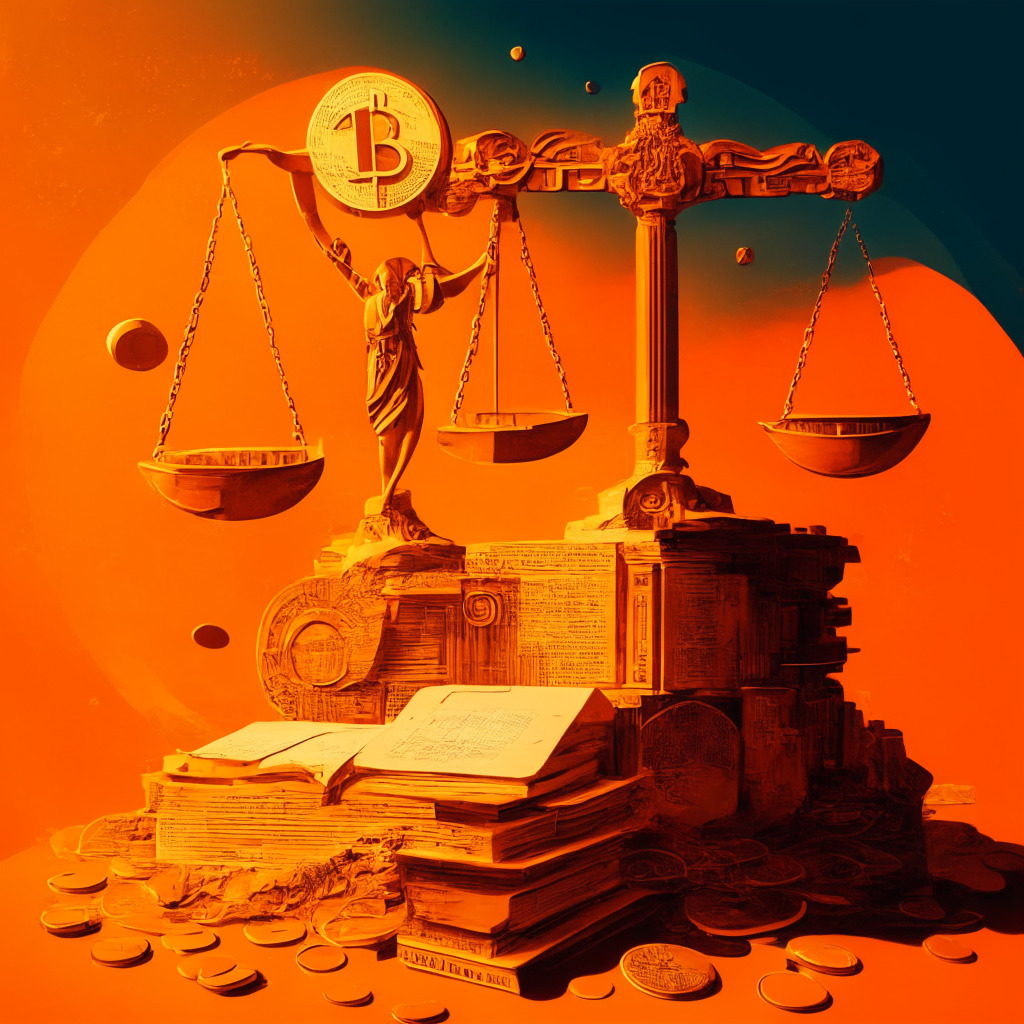The Blockchain Association, a leading crypto trade association, continues to face skepticism and regulatory hurdles despite its five-year existence. With progress impeded by the fall of FTX and reduced support from congress members, the association’s efforts to pass comprehensive crypto legislation remain unsuccessful. Notwithstanding these setbacks, it has managed some victories in mitigating impacts of proposed regulations and supporting member companies. However, the future still presents significant obstacles, and crypto lobbyists are urged to remain humble about their “achievements.”
Category: Regulations
Navigating the Regulatory Tussle: Decentralization vs Security in the Digital Asset Realm
The rapid transformation in technology and finance is due to the expanding incorporation of blockchain technology and digital assets. While this revolution brings significant advantages, it also comes with regulatory complexities. For instance, the recent verdict of the Delaware bankruptcy court granting FTX the right to sell their digital assets highlights control issues contrary to blockchain’s decentralized nature.
EU’s DAC8 Cryptocurrency Tax Reporting Rule: Boost for Accountability or Over-Regulation Menace?
The Directive on Administrative Cooperation (DAC8) rule, aimed at monitoring and evaluating all cryptocurrency transactions within the European Union, was recently approved at the EU parliament. The goal is to assist tax authorities in tracking crypto-assets trade and profits, reducing tax fraud and evasion. However, it raises questions about potential over-regulation and its impact on member countries’ autonomy.
Proposed DCG-Genesis Deal: A Lifeline for Gemini Earn Users or Crypto Regulatory Alarm?
Gemini Earn users could recover between 70%-90% of their cryptocurrency holdings due to a proposed agreement between DCG and Genesis. This agreement averts a Chapter 11 case. The recovery amount represents the soaring appreciation of digital currencies – “$85,000 for BTC and $8,500 for ETH.” However, the deal still requires creditor approval.
Navigating Bankruptcy: How Crypto Exchange FTX Plans to Leverage $3.4 Billion in Digital Assets
Judge John Dorsey has permitted FTX, a bankrupt crypto exchange, to sell and invest its $3.4 billion crypto assets to pay off creditors. FTX’s strategy involves hedging its assets to lower risk and staking digital assets for low risk returns. They also aim to leverage expert knowledge in navigating the volatile crypto market.
Regulatory Scrutiny vs Technological Advancements: Navigating the Complex Crypto Landscape
Despite regulatory challenges and hacking threats, the crypto sphere continues to innovate, with enhanced privacy, user experience, and transaction efficiency. As Ethereum plans a major transformation and Ripple maintains its legal standing, the tokenized assets market could reach $16 billion by 2030. However, effective regulation remains vital to safeguard all stakeholders.
Regulatory Maze: Stoner Cats NFT Scandal and the Lessons for the Crypto World
Stoner Cats 2 LLC (SC2), the creators of the animated series Stoner Cats, has faced charges from the U.S Securities and Exchange Commission for conducting an unregistered offering of crypto asset securities as nonfungible tokens (NFTs). The case underlines the importance of operating within legal regulations, even in the rapidly evolving world of blockchain and cryptocurrencies.
Sam Bankman-Fried’s Detainment: An Indicator of Crypto’s Legal Challenges and Future Resilience
“Regulations continue to be a hot topic in cryptocurrency. This week, developments surround the high-profile case of Sam Bankman-Fried, founder of the once $32 billion dollar-valued cryptocurrency exchange, FTX. His ongoing legal battle serves as a reminder of the turbulent legal waters of the crypto universe.”
Crackdown on NFTs: SEC Targets Stoner Cats 2 for Unregistered Securities Allegations
“The Securities and Exchange Commission targeted Stoner Cats 2’s NFT project for allegedly amassing $8 million through unregistered sales. The company purportedly linked the show’s success to its NFTs’ value, sparking investors’ profit expectations and resulting in accusations of unlawful offerings. Amidst an ongoing crackdown, this highlights the need for stricter regulatory frameworks in the NFT world.”
Emerging Crypto Landscape in Asia: Boon or Bane for Institutional Adoption?
“Institutional adoption of digital assets in Asia is on the rise due to improved regulatory clarity, with key adopters including South Korea, Hong Kong, Japan, and Singapore. However, progress varies across countries. Despite hurdles, the digital asset market’s infrastructure has noticeably strengthened, indicating increased market maturity.”
Bankruptcy and Redemption: Gemini Earn’s Potential Recovery amidst Crypto Market Turbulence
“A proposed remuneration deal for retail creditors of the Gemini Earn program promises a possible recovery of 95-110% of their claims. The payout is contingent on an agreement within diverse Genesis creditor groups and the final form of the agreement.”
AI’s Controversial Role in Music: The Grammy Drama Around AI-Generated Drake Song
“The CEO of the Recording Academy clarified misconceptions regarding an AI-generated Drake song. Despite the song being written by a human, the vocals were not legally obtained nor approved by the artist or label, disqualifying it for Grammy consideration. This highlights issues around copyright law in the context of AI and the need for regulations to keep pace with technology’s evolution.”
Ripple Migration: A Wake-Up Call on Regulatory Clarity in the Crypto Industry
Ripple CEO Brad Garlinghouse revealed that 80% of the company’s recruitments in 2021 will be in nations with clear regulatory landscapes like Singapore, Hong Kong, U.K., and Dubai, due to the ongoing legal frost with the U.S. SEC. This underscores how uncertain regulations can impact global industry growth.
Landmark Sentencing in OneCoin Scandal Raises New Regulatory Questions for Crypto World
OneCoin’s co-founder, Karl Greenwood, received a 20-year sentence for his role in the $4 billion pyramid scheme. OneCoin, which falsely claimed to be a cryptocurrency, caused losses for over 3.5 million victims. This case underscores the urgent need for industry regulation to prevent similar crypto-related scams.
Blockchain Revolution: The Dual Stance of BOE’s New Deputy on Crypto Stability and Risk
Sarah Breeden, the incoming deputy governor of financial stability at the Bank of England, believes that cryptocurrencies are currently not a significant threat to financial stability. Though highlighting risks linked with digital assets, she underlines the potential of crypto technology in bolstering financial systems.
India’s Paradoxical Supremacy in Global Crypto Index: High-Tax-Averse or Accelerator?
“India has topped the Global Crypto Adoption Index 2023, despite strict tax regulations on crypto trades. The tax schemes paradoxically stimulating a shift in transaction methods, thus driving the adoption of digital currencies, particularly in struggling economies like India, Nigeria, and Vietnam.”
U.S. Regulatory Hurdles: Driving Crypto Startups Towards Friendlier Shores?
“Ripple’s CEO, Brad Garlinghouse, argues that the U.S. is the worst country for crypto start-ups due to its hesitance towards digital asset innovation. He highlights the UK, Singapore, UAE, and Switzerland as nations nurturing such innovation. Aggressive lawsuits by SEC and CFTC complicate the implementation of crypto regulations in the U.S., possibly inducing a mass exodus of blockchain startups to friendlier jurisdictions.”
FTX’s New Playbook: Balancing Market Transparency and Strategic Interests in Crypto World
“FTX, a major crypto exchange, has revised its asset sale plan in response to U.S. Trustee concerns, without committing to disclose impending transactions. This move is causing a dip in crypto prices due to fears of a large-scale asset sell-off.”
Crypto Cold War: Navigating Regulations and Market Opportunities in the United States
Ripple’s CEO, Brad Garlinghouse, asserts the U.S. is one of the worst places for starting a crypto business due to regulatory issues. Despite legal victories, regulatory clarity remains elusive, leading Ripple to consider countries with more crypto-friendly policies. This invariably poses a dilemma for crypto businesses when regulations contradict market opportunities.
CEO Departure and Workforce Reduction at Binance.US: Revolution, Uncertainty, and the Future of Crypto
Binance.US chief executive has departed amid the firm’s workforce reduction by about one-third. This coincides with legal trials faced by parent company Binance, including 13 charges by the US Securities and Exchange Commission. The legal officer, Norman Reed, takes over temporarily, leaving uncertainty over the firm’s future.
CBDC Anti-Surveillance State Act: Preserving Financial Privacy in the Age of Digital Currencies
U.S. Representative Tom Emmer, with the support of 49 other Republican representatives, reintroduced the CBDC Anti-Surveillance State Act to prevent unjust financial surveillance through retail central bank digital currencies (CBDCs). Advocates contend such government-sanctioned currency must respect financial privacy, individual freedom, and market competitiveness.
Unraveling the Blockchain Drama: The W&K Info Defense vs. Craig Wright Saga Continues
A U.S. court denied a request by W&K Info Defense to impose criminal sanctions on Craig Wright for incorrectly filling a vital financial disclosure statement. While rejecting the request, they permitted some civil sanctions to proceed. Concerns were raised about incomplete disclosure of Wright’s financial details, including bitcoin holdings.
Navigating Crypto Regulations: The CBDC Anti-Surveillance State Act and the Privacy Debate
“Regulation of cryptocurrencies and the blockchain technology is a pressing topic, with concerns about privacy and government surveillance. The ‘CBDC Anti-Surveillance State Act’, reintroduced by Rep. Tom Emmer, aims to limit unelected authorities in issuing a central bank digital currency (CBDC), fearing it could be used as surveillance resources.”
Upcoming High-Stakes Trial Pits Cryptocurrency against US Justice System
The upcoming trial of former FTX CEO, Sam Bankman-Fried, interlinks the world of justice and cryptocurrencies. The case focuses on crypto investments, views on effective altruism, and potential losses. It may set a new precedent, potentially impacting the crypto community and future regulations.
The Digital Ruble: A Splash in the Global Financial Landscape or Russia’s Field to Plow?
“Russia’s Central Bank Digital Currency (CBDC) – the digital ruble – can play a significant role in curbing black market dollar trading, says former government official, Sergei Kalashnikov. It could minimize the chance of official currency entering the black market, adjust ruble’s value and impact dollar’s growth against it.”
Portrait of Legal Challenges and Tech Advancements in Crypto Space: The FTX Boss and SEC’s AI Integration
Former FTX boss, Sam Bankman-Fried, faced legal complications over his request for temporary release, highlighting challenges in the technological logistics of preparing for trial with limited internet access in prison. Conversely, SEC Chair, Gary Gensler, revealed the agency’s use of AI for financial scrutiny, stirring both excitement and skepticism around potential benefits and concerns such as data privacy and transparency.
FTX Founder’s Legal Battle Sparks Debate on Crypto Regulation Compliance
“The founder of FTX, Sam Bankman-Fried, faces a legal battle that raises questions on the overall regulatory environment in the crypto space. His case highlights the intense scrutiny that key figures in the crypto universe often face, emphasizing the need for clearer, more defined regulations in the burgeoning crypto industry to balance innovation and market integrity.”
AI and Financial Regulation: The SEC’s Quiet Embrace of Artificial Intelligence
The United States Securities and Exchange Commission (SEC) is employing artificial intelligence for financial surveillance, confirmed SEC Chair, Gary Gensler. This technology aids in identifying patterns of market manipulation or fraudulent activities. However, questions about privacy, potential bias, and the need for transparency in the use of such technologies by regulatory agencies persist.
Regulation Roulette: The Balancing Act between Blockchain Privacy and Security
“The OneCoin fraud case highlights significant challenges for cryptocurrency regulations. As the line between privacy and security blurs, there’s a growing need for nuanced regulatory strategies and discernment in this evolving techno-finance landscape to prevent potential violations of user privacy.”
Landmark Testimony in Tether and Bitfinex Lawsuit: What This Means for Crypto Regulations
“Amid the multi-year class action lawsuit against Bitfinex and Tether put forth by LeboBTC CEO, a critical point would be the discussion about the alleged commingling of assets with Tether reserves. It questions the handling of regulatory scrutiny while ensuring blockchain and cryptocurrency sector growth, fostering inclusivity, digital sovereignty, and financial democratization.”
Privacy and Blockchain: Debating the Role & Ramifications of Chainalysis Data Analytics
The Change.org petition “Stop Chainalysis” argues that the company’s data analysis tools are not scientifically verified, potentially violating privacy laws and rights by linking real-world identities to crypto payments. The petition warns about violations of the Bank Secrecy Act and the Fourth Amendment. It highlights the delicate balance between protecting privacy and combating illicit activities.
From Crypto Anarchy to Strict KYC: Is Privacy in the Blockchain Industry at Risk?
Gracy Chen, MD at crypto exchange Bitget, suggests KYC measures might get stricter with users undergoing ID verification perhaps more than once a year. Incorporating biometrics such as facial recognition, fingerprints, or iris scans, into KYC procedures is also gaining traction. Bitget has made KYC mandatory, reflecting a trend in crypto industry’s commitment to transparency and anti-fraud regulations. Chen also stresses the importance of balancing security and privacy, highlighting the role AI can play in enhancing AML capabilities.































